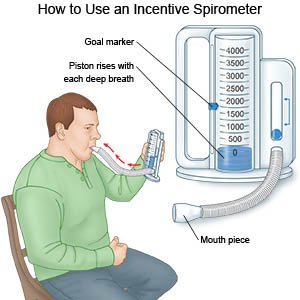Open Splenectomy
Medically reviewed by Drugs.com. Last updated on Aug 4, 2025.
Open splenectomy is surgery to take out all or part of your spleen.
 |
WHILE YOU ARE HERE:
Before your surgery:
- Informed consent is a legal document that explains the tests, treatments, or procedures that you may need. Informed consent means you understand what will be done and can make decisions about what you want. You give your permission when you sign the consent form. You can have someone sign this form for you if you are not able to sign it. You have the right to understand your medical care in words you know. Before you sign the consent form, understand the risks and benefits of what will be done. Make sure all your questions are answered.
- An IV is a small tube placed in your vein that is used to give you medicine or liquids.
- General anesthesia will keep you asleep and free from pain during surgery. Anesthesia may be given through your IV. You may instead breathe it in through a mask or a tube placed down your throat. The tube may cause you to have a sore throat when you wake up.
During your surgery:
An incision will be made in your abdomen to reach the spleen. Your surgeon will remove the whole spleen or only the damaged parts. Bleeding blood vessels will be tied, and the other organs near the spleen will be checked. A drain may be placed to remove fluid or blood from the surgery area. The incision will be closed with sutures and covered with a bandage.
After your surgery:
You will be taken to a room to rest until you are fully awake. Healthcare providers will monitor you closely for any problems. When your healthcare provider sees that you are okay, you will be taken to your hospital room. The bandages covering your incision keep the area clean and dry to prevent infection. A healthcare provider may remove the bandages soon after your surgery to check your incision.
- You will be helped to walk around after surgery. Movement will help prevent blood clots. You may also be given exercises to do in bed. Do not get out of bed on your own until your healthcare provider says it is okay. Talk to healthcare providers before you get up the first time. They may need to help you stand up safely.
- Deep breathing and coughing will decrease your risk for a lung infection. Take a deep breath and hold it for as long as you can. Let the air out and then cough strongly. Deep breaths help open your airway. You may be given an incentive spirometer to help you take deep breaths. Put the plastic piece in your mouth and take a slow, deep breath. Then let the air out and cough. Repeat these steps 10 times every hour.

- Medicines may be given to treat or prevent pain, a bacterial infection, or nausea and vomiting. You may also need medicine to make it easier for you to have a bowel movement. You may need this medicine to prevent constipation.
RISKS:
You may have trouble breathing, or develop pneumonia. Nerves, blood vessels, muscles, and other organs near the spleen may be damaged. You may bleed more than expected. You may develop a life-threatening infection or blood clot. Even after surgery, your symptoms may not get better right away. If your spleen is completely removed, you will always have a higher risk for infections.
CARE AGREEMENT:
You have the right to help plan your care. Learn about your health condition and how it may be treated. Discuss treatment options with your healthcare providers to decide what care you want to receive. You always have the right to refuse treatment.© Copyright Merative 2025 Information is for End User's use only and may not be sold, redistributed or otherwise used for commercial purposes.
The above information is an educational aid only. It is not intended as medical advice for individual conditions or treatments. Talk to your doctor, nurse or pharmacist before following any medical regimen to see if it is safe and effective for you.
Further information
Always consult your healthcare provider to ensure the information displayed on this page applies to your personal circumstances.
